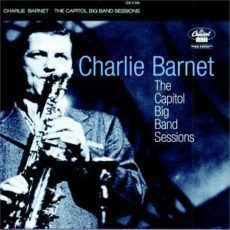
Daily Dose Of Jazz…
Charlie Barnet was born Charles Daly Barnet on October 26, 1913 in New York City. His parents divorced when he was two and he was raised in well-to-do surroundings by his mother and her grandparents. His grandfather was Charles Frederick Daly, a vice-president for the New York Central Railroad, banker and businessman. He attended various boarding schools, both in the New York and Chicago areas, learning to play piano and saxophone as a child. He was often found leaving school to listen to music and to try to gain work as a musician.
By sixteen, Barnet had done road work with a Jean Goldkette satellite band and was in New York, where he joined Frank Winegar’s Pennsylvania Boys on tenor saxophone. Always restless, by 1931 he had relocated to Hollywood and appeared as a film extra while trying to interest local bandleaders in hot music, which was increasingly unpopular due to the Great Depression. By late 1932 he was 18 and returning east, where he persuaded a contact at CBS’ artist bureau to try him out as an orchestra leader.
Charlie began recording in 1933, during an engagement at New York’s Park Central Hotel, but was not a great success for most of the 1930s. Regularly breaking up his band and changing its style by early 1935 he attempted to premiere swing music at New Orleans’ Hotel Roosevelt. However, Louisiana’s Governor Huey Long, disliking the new sound, had the band run out of town, arranged with Joe Haymes to take several of his now-jobless sidemen, and he went to Havana, Cuba as an escort to well-to-do older women.
1936 saw another swinging Barnet edition featuring the up-and-coming vocal quartet The Modernaires but this too quickly faded from the scene. The height of Barnet’s popularity and his first really permanent band came between 1939 and 1941. It was a period that began with his hit version of the Ray Noble tune Cherokee arranged by Billy May. 1944 saw him with another big hit with Skyliner. During his swing period his orchestra included Buddy DeFranco, Roy Eldridge, Neal Hefti, Lena Horne, Barney Kessel, Dodo Marmorosa, Oscar Pettiford, Art House, Maynard Ferguson, Doc Severinsen, Clark Terry and trumpeter Billy May was his arranger before joining Glenn Miller in 1940.
He was one of the first bandleaders to integrate his band; the year is variously given as 1935 or 1937. He was an outspoken admirer of Count Basie and Duke Ellington. Ellington recorded the Charlie Barnet composition In a Mizz. In 1939, Basie lent Barnet his charts after Barnets’ had been destroyed in a fire at the Palomar Ballroom in Los Angeles, California. Throughout his career he was an opponent of syrupy arrangements, however, in the Billy May song The Wrong Idea, he lampooned the “sweet” big band sound of the era.
Barnet penned an autobiography The Swinging Years where he noted the orchestra was a notorious party band where drinking and vandalism were not uncommon. He had several hits across America and in Europe during the late 1940s, thanks to the U.S. Armed Forces Network powerful twin 100 kW transmitters stationed in Munich, Germany.
By 1947, he started to switch from swing music to bebop and in 1949 he retired, apparently because he had lost interest in music. He was able to retire when he chose because he was one of the few heirs in a very wealthy family. He occasionally returned from retirement for brief tours but never returned to music full-time. Tenor, alto and soprano saxophonist, composer and bandleader Charlie Barnet passed away from complications of Alzheimer’s disease and pneumonia on September 4, 1991 in San Diego, California.
![]()
More Posts: saxophone


